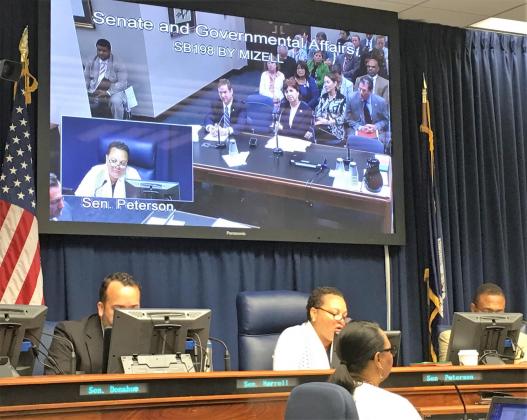
By Matt Houston/Manship School News Service
XFollowing nearly six hours of testimony and six minutes of vote discussion, the Senate Committee on Senate and Governmental Affairs Wednesday killed on identical 4-2 votes, a pair of bills Wednesday that would have made it more difficult to remove Confederate military monuments in Louisiana.
House Bill 71, by Rep. Thomas Carmody, R-Shreveport, would prevent altering, removing, destroying, renaming, or relocating any memorial dedicated to any military event, figure, unit, or organization in American history without a vote of the residents of the entity in which the monument is located.
Senate Bill 198, by Sen. Beth Mizell, R-Franklinton, is not limited to war memorials. It would prevent the removal, relocation, disturbance, or alteration of nearly all memorials without the approval of the Legislature. Carmody’s bill passed through the house 65-31. Debate there centered around the Confederate monuments in New Orleans and was personal. The Black Caucus walked out the House chamber after the measure passed.
Carmody preached local control during the House debate, repeatedly saying the bill gave Louisianans the right to decide on their local memorials’ fates. The first draft of the bill did not allow for a vote, however.
The bill was assigned to the Senate Governmental affairs, a committee composed of five black Democrats and four white Republicans, ensuring its demise, and voting indeed fell along racial and party lines.
The committee questioned the legal implications of the bill, expressing concern that it sets precedent for the circumvention of the elected Legislature in favor of a popular vote.
“This is an issue that deserves more input than just the elected officials,” Carmody said. “We’re talking about an issue that the public feels like it hasn’t been heard on.”
“Either we are going to be a state that believes in referendums like California or not,” Sen. J.P. Morrell, D-New Orleans, retorted. “If we are going to say that locally elected bodies are not competent to represent their constituents… then plenty would argue that, rather than have a legislature, we should have referendums.”
“You can’t say that when Sen. Bishop agrees with me, he’s my senator. When he doesn’t, I should be able to voice it on my own,” said Sen. Wesley Bishop, D-New Orleans.
Chairwoman Sen. Karen Carter Peterson, D-New Orleans, also noted the city council labeled the statues “nuisances” by a 6-1 vote.
“Through the trials and tribulations of the great experiment that is democracy, the United States is where it is today,” Carmody said. “It’s difficult to pull the threads out of the tapestry that is the American people.”
Most of the public that testified in favor of the bills argued that the monuments offer a chance to remember history and learn from past mistakes.
Sen. Troy Carter, D-New Orleans, said no one would support the erection of a monument to Adolf Hitler. Carmody said he was unaware of any statues in his honor in Louisiana.
“Removing these monuments is a slippery slope,” one proponent argued. “If it’s Lee today, it’s Jesus tomorrow.”
Some also argued on behalf of the character of Confederate leaders recognized with monuments in New Orleans.
“This would be a different discussion if P.T. Beauregard were not dressed in a Confederate uniform, riding a horse,” Morrell answered, reading quotes from Confederate leaders.
“We have a monument to (Robert E. Lee), who didn’t believe in Civil War monuments. If we were honoring these men for their post-war accolades, the statues would’ve been put up in a different way and there would’ve been a different response.”
The debate was intense, and sometimes emotional, but Peterson called it “healthy.”
“It’s important for all of us to recognize each other’s heartfelt opinions with respect,” she said. “It’s hard to detach my emotion from my work.”
One woman who spoke in favor of the bill told Peterson she had a “preconceived notion” of who Peterson was, but that after hearing her passionate argument, she felt a “heart-connect,” despite a difference of opinion.
